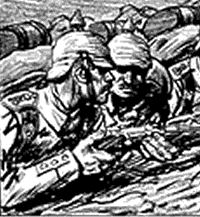 German desire for revenge
German desire for revenge
17 April 1915
In a letter published by the German newspaper, ‘Die Kölnishe Zeitung’, a German soldier in a regiment opposite the French to the north of Ypres gave his reasons as to why German troops were keen to carry out an attack on the French:
“We had been lying opposite one another for months. No amount of pushing and pulling could loosen the steel ring held by the enemy around Ypres. Every attack we made collapsed in furious rifle and artillery fire, as did the attacks made by our enemy. The tenacity and stubbornness of both sides reduced the possibility of either side in the near future managing to win the upper hand by means of a large-scale offensive.

But the enemy then introduced a new factor into the equation: chemical warfare. When the French artillery shells exploded they gave off gaseous fumes, which the British artillery helped to disperse by firing into the same zone. Our German Supreme Command mildly called the fumes “betäubende Dämpfe” - translated as “knock-out vapours or stun fumes”. The use of these gases by the enemy, in rifle bullets as well as artillery shells, brought the anger of our troops to boiling point. With grins on their faces our men began to spread a rumour that the hour of revenge was drawing near.
And then the news we had been waiting for arrived. It is impossible to describe the mood of our troops at that time. Every soldier wanted to be the first to get to the enemy trench. Whole companies volunteered to be in the first wave of the attack. Those who were selected for the role could hardly restrain themselves.” (1)
Victory or Death
A second German account suggests that the soldiers in the front line in the Ypres sector were eager for a confrontation with the enemy.
“Over to our right [in the direction of Dixmuide] we heard the continuous thundering of artillery and from its intensity it sounded as though there was a great battle raging there. In our sector it was very quiet except that the pioneers were busier than usual; pontoon bridging equipment began to appear in our front line sector and girders, beams and planks were brought forward and piled up close behind the front line trenches. As the numerous pioneer officers bustled past us in the trenches we suspected from the secretive look on their faces that something special was being prepared.
Then we learned about the coming attack. I must say that the news was greeted enthusiastically by the men, who were not thinking about the horrors which might be in store during the coming battle. We all busied ourselves eagerly with the preparations for the offensive and could hardly wait for the hour of the attack to come. It would bring with it either victory or death.” (2)
Next>> German justification for poisonous gas
Acknowledgements
(1) Der Völkerkrieg, Band V, p. 163
(2) Der Völkerkrieg, Band V, p. 163
Artist's sketch from a German magazine “Daheim!” printed in early 1915.